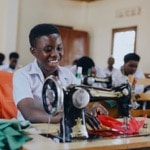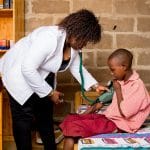Click on a question below to see its answer.
The average trip with Africa New Life is 8 days on the ground. Please factor in one day for travel on either end to get to and from Rwanda.
Currently, there are no vaccines required for entering Rwanda from the United States. Rwanda historically required everyone entering the country to have the Yellow Fever immunization. There are other vaccinations the Centers for Disease Control recommends in order to keep you safe while traveling. These include Typhoid, Tetanus Booster, Hepatitis A & B, Polio Booster, and Meningitis. Travelers should also take an anti-malarial medication during the trip.
Each team member should expect to raise or pay $2,200 plus excursions and airfare for an 8 day, 8 night trip. For variations of trip length, the cost will change +/- $125 per day as adjusted from the 8 days.
Airfare costs vary significantly from the summer to winter months. It is best to prepare for your plane ticket to cost around $2,200 in the summer and $1,700 in the winter. These are simply generalizations based on past years.
Typical airfare routes take between 24 and 40 hours to get from the United States to Kigali, Rwanda.
If you are interested in traveling, please email [email protected]
Africa New Life trips are relationally focused. Trip goals and objectives are centered on this pillar of learning rather than doing. All trips have a focus on developing relationships with the students in our program.
Yes. We make our best effort to have all sponsors visit their sponsored student while on the ground in Rwanda.
Yes. It is culturally appropriate to bring a gift for your sponsored student when you visit their home. We ask all gifts fit in a small backpack. Appropriate items include sports equipment, clothes, school supplies, books, card games, jump ropes, pictures of your family, etc. Inappropriate items include shampoo, toiletries or cosmetics like nail polish or perfume, medicine, vitamins, electronics, candy or money.
Africa New Life operates a Guest House in the capital city of Kigali where we house the teams that come to serve. The house has beds, running water, Wi-Fi, and electricity.
Yes. While it is always important to be cautious when traveling internationally, Rwanda is a safe country to visit.
No. The water from the tap in Rwanda is not safe to drink. Drinking only bottled or boiled water in Rwanda is the best way to stay healthy while on the ground.
You will need a passport and a visa to travel to Rwanda. For U.S. Citizens, the $50 visa is applied and paid for upon arrival in country. If you are from outside of the U.S. please investigate the visa requirements for your home country at rwandaembassy.org.
No. Africa New Life will provide transportation for the team once in country. You will need to provide your own transportation to and from the stateside airports.
The Guest House where you will be staying in Kigali does provide internet access via Wi-Fi. Some individuals bring a personal laptop, others access this Wi-Fi through smart phones. Please note that due to high usage or occasional power outages, there can be inconsistency in this service. We encourage you to be present in Rwanda!
At the Guest House there are chefs who prepare the majority of meals that you will have during your trip. The food is prepared tasty and safely! Please expect to try local cuisines as well as some Western style foods.
Anyone under the age of 14 may only travel to Rwanda with a parent. Anyone between the ages of 15-18 may only travel to Rwanda with a parent, guardian, or qualified youth leader. Youth teams are required to have a ratio of 1 adult for every 4 minors.
Yes. Families with children are more than welcome to come to Rwanda. It is up to the discretion of the parents to know if the children have the maturity and disposition to benefit from and serve on the team.
The primary national language in Rwanda is Kinyarwanda, which everyone grows up learning. English, Swahili, and French are also national languages. There will be translators provided for those that only speak Kinyarwanda.
The climate in Rwanda is pleasurably consistent due to its close proximity to the equator. Expect temperatures to average between 75-90 degrees Fahrenheit. Rwanda has two main rainy seasons (March to April and September to December).
Yes. Africa New Life facilitates the purchase of trip medical insurance for teams. If you wish to purchase your own travel insurance and forgo Africa New Life’s option, please provide details on your chosen insurance to the Team Trip Department for approval.
No. We welcome anyone to travel with Africa New Life. However, we ask that all people traveling with us are respectful of our organization’s beliefs and statement of faith.
Doing proper research before you travel internationally is of great benefit. We require you to read When Helping Hurts by Steve Corbett and Brian Fikkert. Other great reads on Rwanda as a nation include Left to Tell by Immaculee Ilibagiza and Land of a Thousand Hills by Rosamund Carr.
The majority of your time will be spent in a few of the communities that Africa New Life operates in. Africa New Life is currently operating in Kigali, Kayonza, Bugesera, Rubavu, Kageyo A, Kageyo B, Karangazi, Gashora, Nyamirama, Nyamagabe, and Huye.
Yes. Funds raised toward this trip can be done through our office. More information on fundraising will be provided for you when you are a committed traveler with Africa New Life.
26. I sponsor a student through a different sponsorship organization. Can I visit them on this trip?
This depends. You are welcome to reach out to those organizations and arrange for a visit. Each organization has a unique process to set up a visit with a sponsored student. That visit will be facilitated outside of Africa New Life. If you are approved through their system, then we can help you select the best date to visit the student with that organization.
If you are an individual, begin looking for trip announcements on the website and in our monthly email newsletter. If you are a church or organization looking to take a team, please contact [email protected]. Teams are planned one year in advance and trip spots are reserved up to two years in advance.





